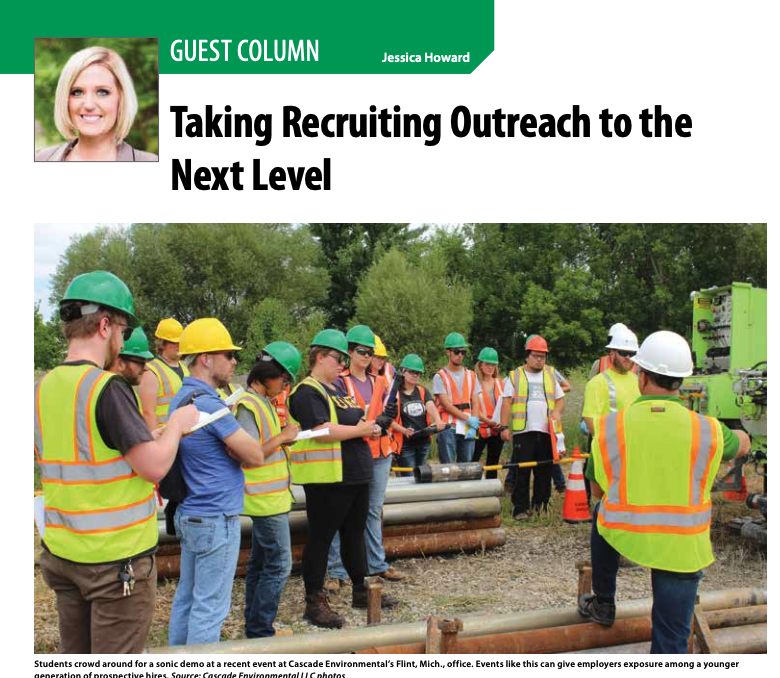Difficulties Recruiting for Field Jobs
By: CascadeThe environmental drilling and sampling industry is facing a particular challenge with today’s workforce. It’s a challenge that is felt across many industries: the skills gap. As older, more skilled workers age out of the job, enter retirement, and exit the workforce, many companies within environmental/engineering industries, like Cascade Environmental, are finding it difficult recruiting skilled Millennials for field craft positions such as Drillers and Environmental Technicians.
In fact, in a 2013 Survey conducted by the Bureau of Labor Statistics, it’s estimated that by 2022 there will be a shortage of 1.6 million skilled workers across a variety of skills-based industries.
With an increasing demand of resources, we can’t wait around until 2022 to see if that projection holds true; many industries are feeling the effects of the skills gap right now! This industry, our organization, our clients and the work that we all do relies on our dedicated field workers.
How The Challenges Inherent to the Younger Talent Pool Can Drive Strategies and Company Culture
There are a few characteristics that present distinct challenges for recruiting and retaining employees from younger generations, namely Millennials and Gen-Z. These characteristics inevitably shape the way that we prospect talent from this demographic. These characteristics also present clear indications of the need to foster a company culture which supports this talent pool. Let’s take a look at three of them.
1. BLUE COLLAR CAREERS ARE LESS ENTICING TO YOUNGER WORKERS
There have been countless articles proclaiming Millennials as the generation that, more than any other, really looks for purpose-driven work, and many point to this as the main characteristic fueling the skills gap. This, like many millennials stereotypes, is only partially true. Yes, Millennials certainly crave a strong sense of purpose to back their work, but no more so than Gen X’ers and Baby Boomers.
The real difficulty in recruiting for field jobs, with regard to Millennials, has less to do with purpose and more to do with education. Unfortunately, younger generations are less inclined to pursue a career path in areas like drilling, and more likely to pursue college degrees that land them in the business or sciences worlds. The work that field service providers, like Cascade Environmental, perform is not always attractive and oftentimes requires employees to be away from home for long periods of time. For most drilling positions, the career is built through field experience, attending a trade school, or often passed down through family history. A college degree may never be part of that career path.
With that challenge in mind, a crucial part of the recruiting effort for the younger talent pool comes down to educating prospects on the potential career path and eventual opportunities that come with field work positions like that of drillers, environmental technicians, and geologists. After all, 76% of millennials think professional development opportunities are one of the most important elements of company culture, so be sure to make it known that your company offers defined career paths with successful end games.
2. EMPLOYEE ENGAGEMENT IS WANING IN THE YOUNGER WORKFORCE
Employee engagement is roughly defined as the level of an employee’s emotional investment in his or her job. As a whole, this quality seems to be on the decline for younger workers. A large part of whether or not an employee is actively engaged has less to do with job performance and much more to do with the company’s culture.
Did you know that 29% of millennials are engaged at work? That means that only 3 in 10 employees are emotionally invested in their work. Even more staggering, 16% are actively disengaged. Employee engagement is a strong indicator of an employee’s experience on the job, as well as their level of productivity. When it comes to the current workforce, it’s much more difficult to keep Millennials actively engaged.
It’s no secret that the younger talent pool places a premium on company culture. Everyone wants to work at a collaborative, supportive, and above all ‘cool’ organization. The organizations that embody those characteristics within their culture are more successful when it comes to recruiting and retaining younger talent. Ensuring that employees are accountable is only one aspect of employee engagement. Ensuring that employees are well supported is another important aspect.
Here are a few examples of programs that drive engagement, and that we are finding to be successful at Cascade:
- Performance Management Programs: These types of programs align employees with company goals, encourage development discussions that keep employees on their desired career paths, and promote ongoing communication between managers and employees.
- Continuous Process Improvement Programs: Ensuring that your organization is always looking for the best and efficient way to run the business gives employees a voice in the business and engage across departments.
- Recurring Company Wide Calls hosted by Leadership Team: Employees want to hear from the leaders of their organization on a regular basis and be given the chance to address questions and concerns. Monthly or quarterly calls (depending on the size of your company) are effective ways to engage with all employees.
3. YOUNGER WORKERS ARE FAR LESS COMMITTED TO EMPLOYERS THAN PREVIOUS GENERATIONS.
This is an unfortunate reality when it comes to Gen-Z and Millennials. Both generations present a much more mobile outlook on their career paths. In fact, it’s been estimated that around 25% of Millennials believe that staying at a job for seven months indicates they're loyal; most Boomers believe that number is five years. What’s more, of those surveyed 91% of Millennials don’t intend to stick with their job for more than three years.
While only a part of the equation, jobs with purpose are important to Millennials as it helps them feel a part of something, and gives them drive to stay the course. In our industry, many of the jobs require time and repetition to develop the skills needed so it is vital to provide that purpose in the meantime. As we all know, losing employees costs a lot of money and time, so putting the effort into retention has a big payoff. Fostering an open and collaborative culture that provides employees with opportunities to learn and grow with the organization is the most effective long-term solution for retaining skilled employees.
At Cascade, programs like our Sustainability program and Green Team give employees the opportunity to make an environmental impact not only internally but externally. Team building events like planting gardens, recycling challenges, and volunteering with local organizations foster strong relationships and improve our company. External sustainability initiatives like ensuring our rigs are efficient and have as low an impact on the environment as possible help our employees know we are doing our part and helping our clients.
Targeted Recruiting
The characteristics and strategies listed above are particularly useful, but when it comes to sourcing talent, you’ve still got to know where to look. While the statistics above represent trends indicative of the younger workforce as a whole, you can mitigate the challenge of recruiting for field jobs from among the younger workforce through targeted recruiting efforts.
TRADE/VOCATIONAL COLLEGES
Although fewer members of the younger talent pool pursue educational paths that are explicitly tied to the sort of careers available at Cascade, we’ve still found plenty of recruitment and retention success in targeting our recruiting efforts towards trade and vocational colleges. Many trade and vocational colleges are willing to partner with companies like Cascade to provide their students with a real viable means of obtaining a job after school, and these partnerships still present the biggest recruiting opportunity for those hiring in this industry.
MILITARY
The Military also presents a significant recruiting opportunity. Many service men and women receive fantastic job-site and educational training as an aspect of their career in the military. As such, after they’re discharged, these folks represent a significantly large talent pool from which to draw skilled recruiters.
Cascade’s Collaborative Culture in Action
There are many different programs active at Cascade that help us foster a culture of collaboration and transparency, and the Cascade Card program is a tangible example of this culture in action. In a nutshell, the Cascade Card is a hazard recognition program that empowers field crews to actively report and mitigate safety hazards they observe while they’re performing various drilling and remediation tasks. This program gives our teammates a real-time means of reporting a hazard via their phone, tablet, laptop, our website, and our mobile app. It enables individuals to take a moment and assess the situation, implement a corrective action, and then proceed to complete the task safely.
Over time, with the utilization of the Cascade Card program, in concert with all the other programs we have here at Cascade, our employees develop skills as expert risk assessors. In turn, they learn to effectively mitigate hazards in the field and implement the correct solutions going forward. Plus, we also use this information to measure and trend what we’re seeing in the field, and how to abate and/or control that. We use that information in our training sessions and as a day-to-day training mechanism for those who haven’t yet developed these skills.
Our ELITE Driller program is another way we work to foster engagement, performance and retention. This program seeks to recognize the company’s most outstanding drillers who have demonstrated exceptional performance with a commitment to the Company’s core values of safety, quality, growth, innovation and sustainability. It rewards the experienced, skillful drillers that are willing to go out of their way to ensure the job gets done safely and exceeds the expectations of our demanding clients.






